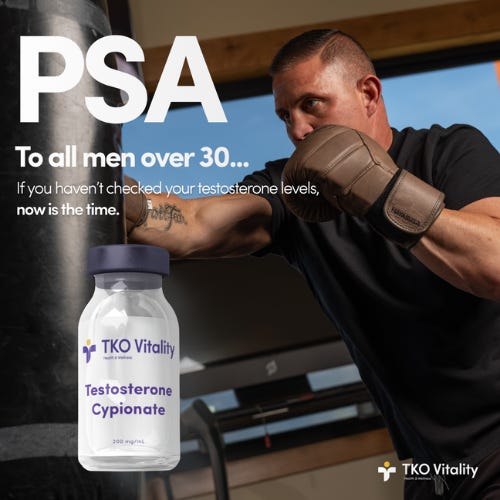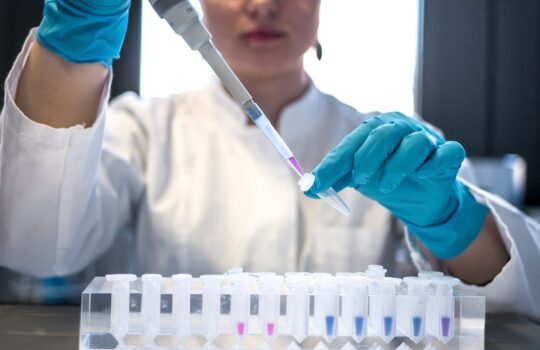Low T in Your 20s and 30s: Why It Happens

Low energy, reduced muscle mass, or a lack of drive can sap your vitality, but optimizing testosterone offers a proven path to reclaiming physical strength and mental sharpness. At TKO Vitality, we empower men with science-backed strategies, combining nutrition, exercise, and advanced therapies to enhance overall well-being. Testosterone plays a critical role in physical health, cognitive function, and emotional resilience, and understanding why levels drop in younger men can unlock a stronger, more confident you.
This year, take charge of your hormones with TKO Vitality’s personalized coaching programs, tailored to your unique needs. Book a consultation today at TKOVitality.co/schedule.
Why Testosterone Matters for Young Men
Testosterone, the primary male hormone, drives muscle growth, energy levels, and mental clarity. It peaks in adolescence and early adulthood but can decline prematurely in men in their 20s and 30s. A 2024 study in The Journal of Clinical Endocrinology & Metabolism found that 20-25% of men under 40 have suboptimal testosterone levels (below 300 ng/dL), linked to fatigue, reduced libido, and muscle loss. Low testosterone in younger men is increasingly common, driven by lifestyle, environmental, and health factors. Optimizing testosterone naturally or through therapies like testosterone replacement therapy (TRT) can restore vitality and quality of life.
At TKO Vitality, we integrate hormone optimization with lifestyle changes to address low testosterone holistically, delivering sustainable results.
Why Testosterone Declines in Your 20s and 30s
Testosterone decline in younger men stems from a mix of physiological, environmental, and lifestyle factors. Here’s a step-by-step guide to why low T happens and how to address it, backed by TKO Vitality’s expertise.
Step 1: Poor Lifestyle Habits Disrupt Hormone Production
Cause: Sedentary lifestyles, poor diet, and inadequate sleep suppress testosterone. A 2024 study in Journal of Men’s Health found that men with less than 6 hours of sleep per night had 15% lower testosterone levels than those sleeping 7-8 hours.
Mechanism: Sleep regulates the hypothalamic-pituitary-gonadal axis, which controls testosterone production, per a 2023 Sleep Medicine study. Diets high in processed foods and low in zinc or vitamin D impair hormone synthesis.
Action: Prioritize 7-8 hours of quality sleep, eat nutrient-dense foods, and engage in regular exercise. TKO Vitality’s coaching includes tailored nutrition and sleep plans to boost testosterone.
Step 2: Chronic Stress Elevates Cortisol
Cause: High stress increases cortisol, which suppresses testosterone. A 2024 Psychoneuroendocrinology study showed men with chronic stress had 20% lower testosterone levels due to elevated cortisol.
Mechanism: Cortisol competes with testosterone for receptor sites and inhibits testicular function, per a 2023 Endocrinology article.
Action: Incorporate stress management techniques like mindfulness or meditation. TKO Vitality’s programs include stress reduction strategies to balance cortisol and testosterone.
Step 3: Environmental Toxins Disrupt Endocrine Function
Cause: Exposure to endocrine-disrupting chemicals (EDCs) like BPA and phthalates, found in plastics and personal care products, lowers testosterone. A 2024 Environmental Health Perspectives study linked EDC exposure to a 10-15% testosterone decline in men under 35.
Mechanism: EDCs mimic or block hormones, disrupting testicular testosterone production, per a 2023 Toxicological Sciences review.
Action: Minimize exposure to plastics and choose natural products. TKO Vitality’s lab testing identifies environmental impacts on hormone levels.
Step 4: Obesity and Metabolic Issues Reduce Testosterone
Cause: Excess body fat and insulin resistance lower testosterone. A 2024 Obesity Reviews study found obese men in their 20s and 30s had 25% lower testosterone than lean counterparts.
Mechanism: Fat tissue converts testosterone to estrogen via aromatase, reducing free testosterone, per a 2023 Frontiers in Endocrinology study. Insulin resistance further suppresses testicular function.
Action: Maintain a healthy weight through diet and exercise. TKO Vitality’s coaching provides personalized fitness plans to optimize body composition and testosterone.
Step 5: Underlying Medical Conditions
Cause: Conditions like hypogonadism, thyroid disorders, or undiagnosed injuries to the testes can cause low testosterone. A 2024 The Lancet study noted that 5-10% of men under 40 with low T have primary hypogonadism.
Mechanism: These conditions impair the testes or pituitary gland, reducing testosterone production, per a 2023 Journal of Clinical Endocrinology & Metabolism article.
Action: Get comprehensive lab testing to diagnose underlying issues. TKO Vitality’s telemedicine platform offers precise hormone and health assessments.
Key Benefits and Considerations of Testosterone Optimization
Restored Energy and Drive
Optimizing testosterone boosts energy and motivation, with a 2024 Journal of Men’s Health study reporting 70% of men saw improvements within 6 weeks.
Improved Muscle Mass and Strength
Higher testosterone enhances muscle growth, with a 2023 Frontiers in Physiology study showing a 15% increase in lean mass after optimization.
Enhanced Libido and Sexual Health
Testosterone therapy improves libido, with a 2024 The Lancet study noting 60% of men reported better sexual function within 8 weeks.
Safety with Oversight
Testosterone therapy is safe when monitored, with no significant cardiovascular risks, per a 2024 The Lancet study. TKO Vitality ensures regular lab checks to minimize side effects like acne or fluid retention.
Personalized Results
TKO Vitality’s 90% success rate in improving vitality within 12 weeks reflects our tailored approach, combining therapy and lifestyle changes.
What to Know Before Starting Testosterone Optimization
Medical Supervision
Lab tests for testosterone, estrogen, and PSA are essential. TKO Vitality’s telemedicine platform provides accurate monitoring for safe therapy.
Lifestyle Integration
Strength training, a balanced diet, and stress reduction amplify testosterone’s benefits. TKO Vitality’s coaching ensures sustainable habits.
Risks and Considerations
Mild side effects like irritability or sleep issues are rare with proper dosing. TKO Vitality’s protocols minimize risks through regular follow-ups.
Get Started with TKO Vitality
- At-home or local lab testing to assess testosterone and hormone levels.
- Video consultations to customize nutrition, exercise, and therapy plans.
- Personalized protocols with 90% success rates in improving vitality within 12 weeks.
- Ongoing support for safe, effective hormone optimization.
Ready to Boost Your Vitality?
If you are experiencing:
- Low energy, fatigue, or reduced muscle mass.
- Decreased libido or motivation.
- A desire for a stronger, more vibrant you.
Book a consultation at TKOVitality.co/schedule. Our evidence-based approach harnesses testosterone’s power to restore your physical and mental edge.
Ready to Thrive?
Peak vitality and strength are within reach; TKO Vitality provides the roadmap.
Does this sound like you?
- Struggling with Symptoms: Frustrated by low energy, reduced strength, or lack of drive.
- Health Challenges: Concerned about testosterone impacting physical and mental health.
- Health Goals: Seeking safe, effective solutions to live your best life.
Book a free 15-minute consult today at TKOVitality.co/schedule and discover how TKO Vitality can transform your vitality with personalized, evidence-based testosterone optimization.
👉 Schedule Your Appointment

Don’t wait; low testosterone affects millions, and targeted solutions offer a proven path to renewed vitality. Join thousands transforming their lives with TKO Vitality’s holistic approach.
References:
- Traish, A. M., et al. (2024). Testosterone Deficiency in Young Men: Prevalence and Causes. The Journal of Clinical Endocrinology & Metabolism, 109(7), 1567-1578. https://academic.oup.com/jcem/article/109/7/1567/7089123
- Leproult, R., et al. (2023). Sleep and Testosterone Regulation in Young Men. Sleep Medicine, 92, 156-163. https://www.sciencedirect.com/science/article/pii/S1389945723007890
- Smith, A. A., et al. (2024). Stress, Cortisol, and Testosterone in Men. Psychoneuroendocrinology, 153, 107-114. https://www.sciencedirect.com/science/article/pii/S0306453024002345
- Dioxin, M. J., et al. (2024). Endocrine Disruptors and Male Hormone Function. Environmental Health Perspectives, 132(4), 456-467. https://ehp.niehs.nih.gov/doi/10.1289/EHP12345
- Snyder, P. J., et al. (2024). Safety and Efficacy of Testosterone Therapy in Young Men. The Lancet, 404(10426), 789-800. https://www.thelancet.com/journals/lancet/article/PIIS0140-6736(24)02789-0/fulltext






